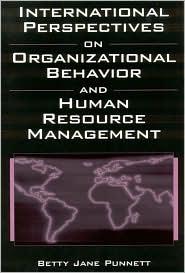

 |

|

The average rating for International perspectives on organizational behavior and human resource management based on 2 reviews is 3.5 stars.
Review # 1 was written on 2015-09-01 00:00:00 Jonathan Harrison Jonathan HarrisonRethinking Expertise stands as the elaboration of Collins and Evans' proposed "Third Wave" trajectory for science studies. If the "Second Wave" attempts to reveal the ways in which scientific knowledge is socially constructed, the Third Wave seeks to set limits on just how far that construction can reach. In short, C&E want to establish what they call a "realist" perspective on expertise, which is to say, expertise really exists and is not merely an artifact of culture, politics and power. Rather, expertise arises from experience. The category of experiential knowledge takes on great importance for C&E, as contrasted with propositional or formal knowledge. Relying on Michael Polanyi's concept of "tacit knowledge," or knowledge that can be gained only through hands on experience and cannot be formally communicated outside of context, C&E argue that people without hands-on scientific expertise should not participate in the appraisal of that knowledge. At the same time, C&E argue that Polanyi's notion of a "Republic of Science" will not do. The Republic of Science, which insists on autonomy from politics and a completely internal judgment process, excludes potential experts who have experience but no credentials. C&E attempt to lay out different sorts of expertise in order to show us who does and doesn't have the right to engage in conversations about the validity of scientific knowledge. For example, "contributory experts" actually do experiments and research in science, so they are the most qualified to understand one another and judge the others' work. They also introduce the category of "interactional expert," which is someone (or rather, it's a skill that anyone can have along with other sorts of skills as well) who speaks the language of the contributory expert well enough to fluently understand the issues and concerns of their science. And so on, with other types of expertise, as well as some explorations into how we might tell them apart (for example, a color blind person could fluently learn to discuss colors, much like an interactional expert...they basically want to modify the notion of a Turing Test, but for telling experts apart. This is especially relevant in a regime based on distinctions in tacit knowledge, since computers can't have that kind of understanding). Ultimately, C&E want to re-instate demarcation criteria between science and non-science because without them publics far away from the sites of knowledge production could be thought to have equal purchase on the interpretation and creation of scientific knowledge. This is unacceptable to them because they argue that scientific knowledge is epistemically privileged. Even if this is the case, C&E just don't properly consider the politics of expertise formation and validation. For example, in the case that Brian Balogh considered regarding the production of nuclear science expertise that I recently wrote about, one of the salient features of this expertise was its almost exclusive presence within the military or other groups already committed to certain courses of action with respect to commercialization of nuclear power. No experts even existed to challenge this powerful group, representing government, military, scientific and corporate interests. This suggests that the production of expertise itself is itself a political issue, regardless of whether those experts really do have a better grasp on what they're doing or talking about. Also, though C&E readily admit that the pace of politics is much faster than that of science, this mismatch makes the construction of expertise even more politically salient. Ultimately, it's a bit inaccurate to say that "Second Wave" science studies generally tried to overturn the purchase of science on truth. In fact, plenty of second-wavers, if you want to accept that label, just aren't interested in truth at all. You don't have to take a philosophical stance on the realism of science or expertise to study the ways in which knowledge gets produced in particular ways in particular contexts of political, cultural and institutional interest. Though I really agree that we need new tools to think about the problems of democracy and expertise, I'm not sure that rehabilitating demarcation is the most production way forward. |
Review # 2 was written on 2015-12-05 00:00:00 Rodrigo Golla Rodrigo GollaSo much of the sociology of scientific knowledge tradition appears as a game of chicken, teetering on the edge of relativism or nihilism, if not actually plunging in. The authors' choice of epigraph--"to everything there is a season . . . a time to break down, and a time to build up," from Ecclesiastes--is an indication that this investigation of expertise represents a stepping back from the brink. It is not vertiginously exciting, crackling with analytical profundity, but it is useful in its sober modesty. It maps out a terrain, and offers a new vocabulary to help distinguish among the many different types of expertise. I found especially interesting and helpful the notion of "interactional expertise." As a policy consultant I have collaborated for years with chemists, geologists, etc., on water quality issues. I wouldn't be able to run the laboratory equipment, but I can speak and write about the stuff, and sometimes can write it more clearly and cogently than the specialists. Until I read this book I didn't have a word to describe it, but like Harry Collins in his sociological field work, I have acquired a good deal of interactional expertise. |
CAN'T FIND WHAT YOU'RE LOOKING FOR? CLICK HERE!!!